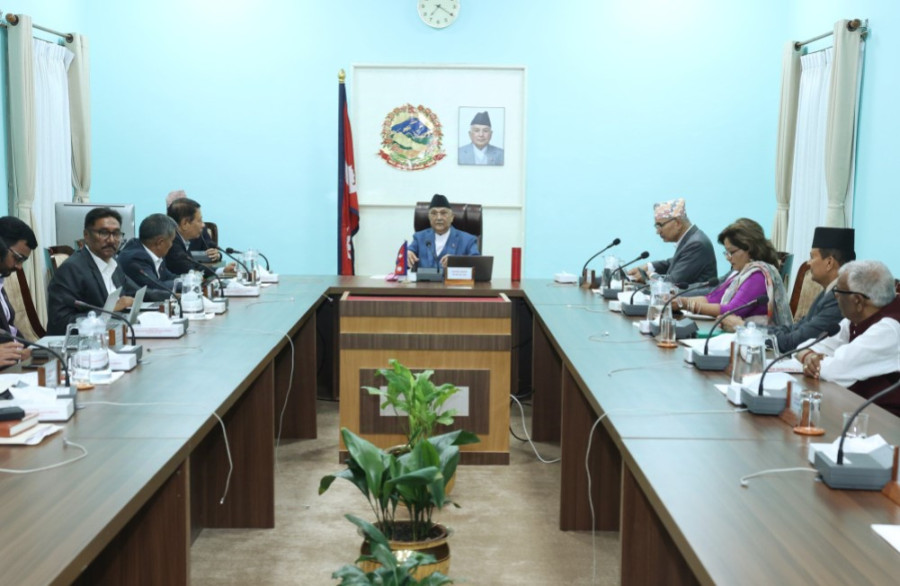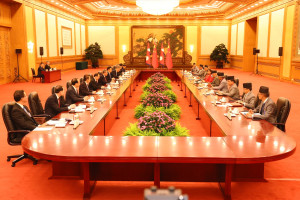National
Fairness concerns at start of transitional justice nominations
Rights group, victims call for genuine consultations and fair appointments as the recommendation process begins.
Binod Ghimire
Two months after the bill to amend the Enforced Disappearances Enquiry, Truth and Reconciliation Commission Act, the committee formed to recommend candidates for chairpersons and members of the two transitional justice commissions finally commenced its work on Sunday.
The committee held its first meeting on the very day it got full shape. Earlier, on April 12, even before the Act was amended, the former government led by Pushpa Kamal Dahal had constituted a committee under Om Prakash Mishra, a former chief justice, to nominate candidates for the Truth and Reconciliation Commission and the Commission of Investigation on Enforced Disappeared Persons. But the committee couldn’t take full shape as the National Human Rights Commission (NHRC) refused to send its representative until the law was revised.
The upper house endorsed the bill on August 22 after it was passed by the House of Representatives on August 14.
After a long gap, the Cabinet reconstituted the Mishra-led committee on Friday, replacing one of its members. While Arjun Karki, a former ambassador and Stella Tamang, a rights activist, have been repeated in the new committee, Khamma Bahadur Khati, a former attorney general, has replaced Jagdish Sharma Poudel, a retired Supreme Court justice.
Based on the request of the Ministry of Law, Justice and Parliamentary Affairs, the constitutional human rights watchdog has sent its member Manoj Dawadi as its representative to the nomination committee. While the government picks four members to the committee, the fifth member is either the NHRC chairperson or someone nominated by him/her.
“Today’s [Sunday’s] meeting was basically introductory. We have decided to finalise the working procedure before starting the search for candidates,” Khati, a spokesperson of the committee, told the Post.
As per the revised Act, the five-member committee has a maximum of two months to select ten office bearers for the two transitional justice commissions. “The countdown for the nomination committee started as soon as it got the full shape,” Man Bahadur Aryal, a joint-secretary at the ministry who oversees transitional justice, told the Post.
The committee must first develop a working procedure and prepare a list of aspirants. It will then make public the names of shortlisted candidates for feedback. “It will recommend candidates for chairpersons and members for the two commissions from the shortlist after evaluating their background and public feedback,” reads a provision in the Act.
Each commission has five members including the chairperson.
The victims of the decade-long insurgency and human rights defenders have said the selection of the commissions’ leadership must be done by maintaining full transparency and ensuring that competent experts get picked.
“The selection process must be consultative to widen its ownership among stakeholders,” Surya Dhungel, a member of the NHRC, told the Post. “Our representative will play a role in making the process more transparent and widely acceptable.”
The Accountability Watch Committee, a network of human rights defenders, has said the committee must ensure the validity and credibility of the selection process. “The committee emphasises that the official selection process should move forward in a way that ensures ownership from all parties concerned, including all victims,” reads its statement.
The statement stresses that the newly formed selection committee must adopt an open, transparent, consultative, and participatory selection method and process (including public hearings) to select officers and pave the way for the legitimate completion of the remaining tasks of the transitional justice process.
The two commissions have been defunct since July 2022, when the government extended their terms without retaining their chairmen and members. The government claimed the bill to amend the transitional justice law would be endorsed by October 2022, and the appointments would be made based on the revised Act.
However, the federal parliament took over two years to endorse the bill. The victims and human rights defenders are now closely watching who will be appointed to the commissions.
The truth commission has received 63,718 complaints, while the commission on disappearances is sitting on around 2,400 cases. The new teams will have four years to accomplish their tasks, though there are provisions for their extension. The commissions, first formed in 2015, have done little beyond collecting complaints and conducting preliminary investigations on some cases.
Suman Adhikari, the founding chairperson of the Conflict Victims’ Common Platform, says it was wrong to form the committee under the leadership of Mishra, who Adhikari claims failed to perform his job transparently last time. In 2020, a Mishra-led committee had nominated chairpersons and members of the two commissions, but they failed to carry out their duties.
“The committee should adopt a credible and transparent selection process. All the stakeholders must be consulted in a true sense,” said Adhikari. “There must be a public hearing of the candidates before their nomination. But looking at Mishra’s history, I am not hopeful that competent people will be selected.”




 19.12°C Kathmandu
19.12°C Kathmandu













